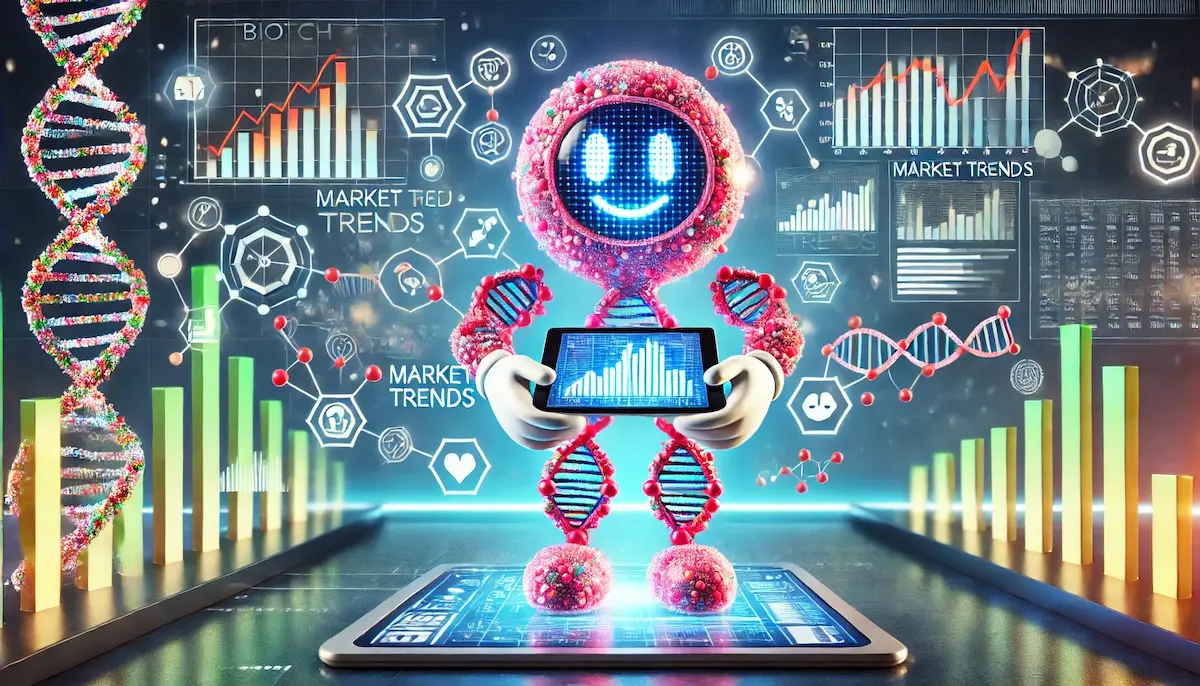The biotechnology industry is at the forefront of scientific innovation, driving advancements in healthcare, agriculture, environmental sustainability, and more. As the industry evolves, several key market trends are shaping its future, influencing everything from research and development (R&D) to market strategies and investment opportunities.
1. Growth in Precision Medicine
Precision medicine is revolutionizing the way diseases are treated, focusing on tailoring medical treatments to individual patients based on their genetic makeup, environment, and lifestyle. This trend is gaining momentum due to advancements in genomics, big data, and bioinformatics, enabling more personalized and effective therapies.
- Genetic Therapies: The development of gene editing technologies like CRISPR and CAR-T cell therapy is driving the growth of treatments designed to correct genetic disorders at their source.
- Targeted Drug Development: Pharmaceutical companies are increasingly focusing on developing drugs that target specific molecular pathways, improving treatment efficacy and reducing side effects.
2. Expansion of Biotechnology in Agriculture
Agricultural biotechnology, or agritech, is seeing significant growth as the demand for sustainable and efficient food production increases. Innovations in this area are helping to address global food security challenges by enhancing crop yields, improving resistance to pests and diseases, and reducing environmental impact.
- Genetically Modified Organisms (GMOs): Advances in GMO technology are leading to crops that are more resilient to climate change, pests, and diseases.
- Bio-Based Fertilizers and Pesticides: The development of bio-based agricultural inputs is promoting sustainable farming practices by reducing reliance on chemical fertilizers and pesticides.
- Precision Agriculture: Biotechnology is playing a key role in precision agriculture, where data and technology are used to optimize farming practices and resource use.
3. Rise of Biopharmaceuticals
The biopharmaceutical sector, which includes biologics like monoclonal antibodies, vaccines, and recombinant proteins, continues to grow rapidly. These biologics offer new treatments for complex diseases, such as cancer and autoimmune disorders, where traditional small-molecule drugs are less effective.
- Monoclonal Antibodies: The market for monoclonal antibodies is expanding, particularly in oncology, where they are used to target and destroy cancer cells.
- Biosimilars: As patents for many biologic drugs expire, the biosimilar market is growing, providing cost-effective alternatives to branded biologics.
- Vaccine Innovation: The COVID-19 pandemic has accelerated vaccine development, leading to new platforms like mRNA vaccines, which have broader applications beyond infectious diseases.
4. Integration of Artificial Intelligence and Big Data
Artificial intelligence (AI) and big data are becoming increasingly integral to biotechnology, transforming how research is conducted and how healthcare is delivered.
- Drug Discovery: AI is being used to accelerate drug discovery by analyzing large datasets to identify potential drug candidates, predict their effectiveness, and optimize clinical trials.
- Personalized Medicine: Big data analytics enables the integration of genetic, clinical, and lifestyle data to create personalized treatment plans for patients.
- Predictive Analytics: AI and machine learning models are being used to predict disease outbreaks, patient responses to treatments, and potential adverse effects, improving decision-making in healthcare.
5. Growth in Digital Health and Telemedicine
The rise of digital health and telemedicine is transforming patient care, making healthcare more accessible, efficient, and personalized. This trend has been accelerated by the COVID-19 pandemic, which highlighted the need for remote healthcare solutions.
- Wearable Technology: Devices that monitor health metrics such as heart rate, glucose levels, and physical activity are becoming more advanced and widely adopted, providing real-time data to both patients and healthcare providers.
- Telehealth Platforms: Telemedicine services are expanding, allowing patients to consult with healthcare providers remotely, reducing the need for in-person visits.
- Digital Therapeutics: These are software-based interventions that treat medical conditions, such as digital apps for mental health, which are gaining regulatory approval and market acceptance.
6. Increased Focus on Sustainability and Green Biotechnology
Sustainability is becoming a major focus in biotechnology, particularly in areas like bioenergy, bioplastics, and sustainable agriculture. Green biotechnology is driving innovations that reduce environmental impact and promote the use of renewable resources.
- Biofuels: Advances in the production of biofuels from algae and other biological sources are helping to reduce the reliance on fossil fuels and lower carbon emissions.
- Bioplastics: The development of biodegradable plastics from biological materials is addressing the global challenge of plastic pollution.
- Sustainable Agriculture: Biotech innovations, such as nitrogen-fixing crops and drought-resistant plants, are contributing to more sustainable farming practices.
7. Expansion of Biotechnology in Developing Markets
Emerging markets are becoming increasingly important in the biotechnology industry, both as markets for biotech products and as centers for R&D and manufacturing.
- R&D Hubs: Countries like China, India, and Brazil are investing heavily in biotechnology, establishing R&D centers and biotech clusters to drive innovation.
- Affordable Biologics: Developing markets are seeing growth in the production and consumption of biosimilars and other affordable biotechnologies, expanding access to advanced therapies.
- Regulatory Harmonization: Efforts to harmonize regulatory frameworks across different regions are facilitating the entry of biotech products into new markets, promoting global growth.
8. Increase in Mergers, Acquisitions, and Strategic Alliances
The biotechnology industry is witnessing a surge in mergers, acquisitions, and strategic alliances as companies seek to expand their capabilities, access new technologies, and enter new markets.
- Biotech-Pharma Collaborations: Collaborations between biotech startups and large pharmaceutical companies are increasing, allowing both parties to leverage each other’s strengths in drug development and commercialization.
- Cross-Industry Partnerships: Partnerships between biotech companies and firms in sectors like technology, agriculture, and energy are fostering innovation and expanding the applications of biotechnology.
- Investment in Startups: Venture capital investment in biotech startups is growing, fueling innovation and the development of next-generation therapies and technologies.
Conclusion
The biotechnology industry is rapidly evolving, driven by advancements in precision medicine, AI, sustainability, and global expansion. These trends are shaping the future of healthcare, agriculture, and environmental protection, offering new opportunities for innovation and growth. As the industry continues to advance, companies that stay ahead of these trends will be well-positioned to lead in this dynamic and transformative field.
Blockfine thanks you for reading and hopes you found this article helpful.
